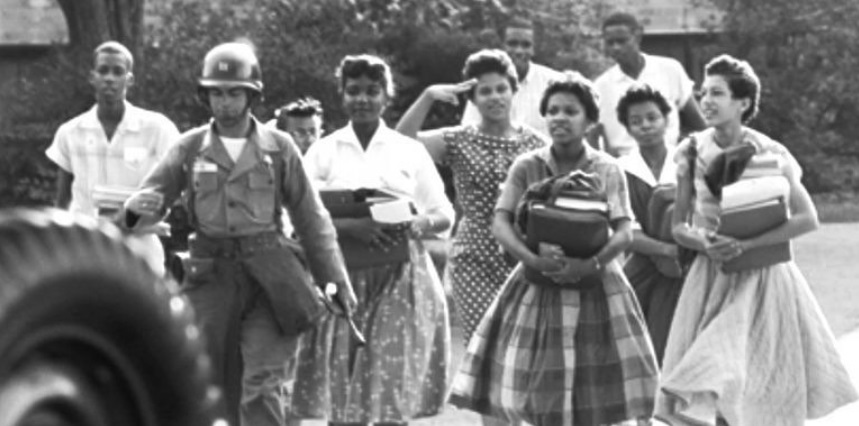
Melba Pattillo Beals (white blouse, behind soldier) and her classmates are escorted into Little Rock Central High School.
Virtual Author Talk with Dr. Melba Pattillo Beals
Hartford Public Library/ The Bushnell
Hartford
May 7, 2025
It’s not often that you get a chance to speak to a living legend, but I had that opportunity when Dr. Melba Pattillo Beals, one of the Little Rock Nine who helped to desegregate Little Rock Central High School in the late 1950s, addressed a gathering in Hartford.

Dr. Melba Pattillo Beals.
The virtual event was presented by the Hartford Public Library in conjunction with The Bushnell. The event was billed as a book talk to discuss Dr. Beals’ memoir, Warriors Don’t Cry. Dr. Beals moved the conversation quickly beyond the book and spoke from the heart about one of the most difficult circumstances anyone has had to face.
I felt like I could understand where Dr. Beals was coming from as she shared her experiences. Of course, I never had to do anything as harrowing as integrating a school in the Deep South with soldiers standing by for my protection. I was, however, a child who was bused out of my Hartford neighborhood and sent to Simsbury Public Schools for a chance at a better education. Let me tell you from personal experience: It was not easy being one of a literal handful of Black children bussed in to go to school with 600 white kids.
The fact of the matter is that integration enacts a toll. Putting people of different races together does not automatically solve any problems without a wholesale change in attitudes and opinions. Dr. Beals discussed how her experience at Little Rock Central High School caused her and her Black classmates emotional and psychological distress for decades afterwards.
“I had something like maybe eight years of therapy,” she said. “Someone among us went totally nuts for many, many years and was eventually given some medication. The experience had a profound effect on my ability to be married, my ability to work. I didn’t trust anybody.
“But I’ve had a lot of therapy, and I’ve read a lot, and I’ve worked really, really hard to cure my thoughts. Having been brought to California and living with a white family cured some of my negative thoughts about white people.”
The white family that Dr. Beals referred to took her in after she began to receive death threats. The Klan placed a $10,000 bounty on the heads of the Little Rock Nine. That’s nearly $120,000 in 2025 dollars. To murder children.
Dr. Beals revealed that when Dr. Martin Luther King visited Little Rock, she complained directly to him about the abuse she was facing. Dr. King told her that she had to endure because she wasn’t integrating the high school for herself, but for future generations. Dr. Beals admitted that she was angry with King for years after he said that.
I’m one of those future generations. Dr. Beals is the same age as my grandmother. So how has her sacrifice worked out?
Well, I wrote my thesis in 2013 about my alma mater, Bloomfield High School, and how incredibly segregated it is despite serving an integrated town. One only need compare the demographics of Hartford and Simsbury to see that, despite the hardships Dr. Beals and her classmates endured, we’re still not much closer to the integrated society King told her to suffer for.
So I asked her point blank: “There have been arguments, especially from younger Black Americans, that integration in some ways undermined Black professionalism and economic independence, because our money left our communities to go to white stores and schools. How do you respond to that?”
Dr. Beals didn’t mince words.
“You’re right, It did leave Black communities,” she said. “And now you’ve lost it. Can you get it back?
“Integration doesn’t have an awful lot to do with money. It’s about access to resources. You can’t survive on a planet without resources. And you’re not integrating because, as my grandmother used to say, sitting down by a white man is going to make you coins. We’re not integrating so we can walk beside or sit beside. We’re integrating because we want opportunity. We want a piece of the pie.
“Listen to me, suppose you were cooking a pie and you were in the kitchen, and I’m in the other room and I’m saying, ‘Hey, you gonna save me some pie?’ You have to be in the room.”
NEXT
Jamil heads to Parkville Market for a new exhibit of local artists.